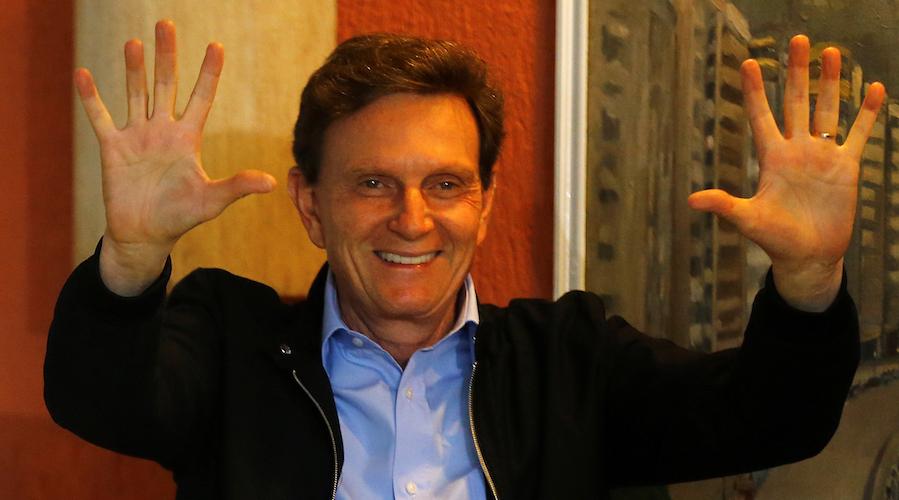Rio just elected a very conservative mayor. Activists are worried about LGBT rights.
Marcelo Crivella, the new mayor of Rio de Janeiro, gestures to photographers after voting during the municipal elections on Oct. 30.
The new mayor of Rio de Janeiro, the Brazilian city loved for its openness, once described homosexuality as a “terrible evil.”
Yet Marcelo Crivella, who won the final round of Rio’s mayoral election on Sunday with 59 percent of the vote, insists he’ll be a unifier, not a divider.
Crivella is also seeking to distance himself from the Pentecostal Universal Church of the Kingdom of God, where he was a bishop. The church, one of the largest and most powerful in Brazil, has been accused of money laundering and corruption.
But some of the city’s human rights activists aren’t convinced of Crivella’s stated harmonious intentions. They see the conservative evangelical bishop’s election as the start of a broader political push by the hard right. And they worry that citizens’ rights will be harmed with Crivella as mayor.
“I don’t see the sheep’s clothing on him, I think he’s a wolf,” said Jindera Queiroz, a lesbian activist in Rio de Janeiro. “I think he represents a very risky climate that is going on and growing really fast in Brazilian society. It’s not only in Rio at all. If you look at other states, the same is going on as well.”
The evangelical movement, and especially the Universal Church, has been grooming political candidates in Brazil’s big cities for at least a decade, and Crivella’s win is a huge step forward for them, said Mauricio Santoro, a political science professor in Rio.
“I think Crivella will be the first one in a long line of evangelical politicians in Brazil trying to govern major cities,” Santoro said. “That’s why he’s so important to other evangelicals.”
Crivella did not respond to several requests for an interview.
In his victory speech on Sunday, the new mayor again tried to strike a conciliatory and unifying tone. He thanked various religious groups — from the Catholic Church to Brazil’s African-rooted Candomble faith — for supporting him in the final vote and promised to work to “take care of people” by cutting hospital waiting lines and boosting free kindergarten.
But activists worry that Crivella’s words don’t represent his true motives, especially in terms of gender and sexual equality. There is real fear among the left that the new Rio mayor will turn the clock back on recent improvements.
“If you go to YouTube for instance, and you check some of his recent speeches on homosexuality, you’ll see that he says things like ‘homosexuality is OK, but we cannot forbid the religious people to say that homosexuality is a sin, that it’s something perverted, dirty, that should be condemned,’” said Veriano Terto, an activist, professor and researcher at the Brazilian Interdisciplinary AIDS Association.
Terto, Queiroz and others worry that Crivella could order local police to clamp down on clinics that offer abortions to women who have been raped (abortion is only legal in limited instances in Brazil). Or that funding for educational and outreach programs for AIDS and HIV will be cut. Or that Rio’s local police, already notorious for their poor treatment of the gay community, will get worse.
While Rio is seen by much of the world as an open and liberal city, thanks to events like its annual Carnival and Pride Parade, Terto warned that reality is much more precarious for the LGBT community here.
Transgender people, particularly, are disproportionally the victims of violence in Rio, Terto said. And while he thinks the city will continue touting itself as a gay-friendly tourist destination, he said life could be about to get worse for the local community.
“Our former administration has been trying in the last year to sell Rio de Janeiro abroad as a liberal and a friendly tourist spot for LGBT people,” Terto said. “I think they will try to keep this image because this gives money to the city. But that reality doesn’t apply for foreigners who could live here and especially for all the Cariocas, the residents of Rio de Janeiro.”
